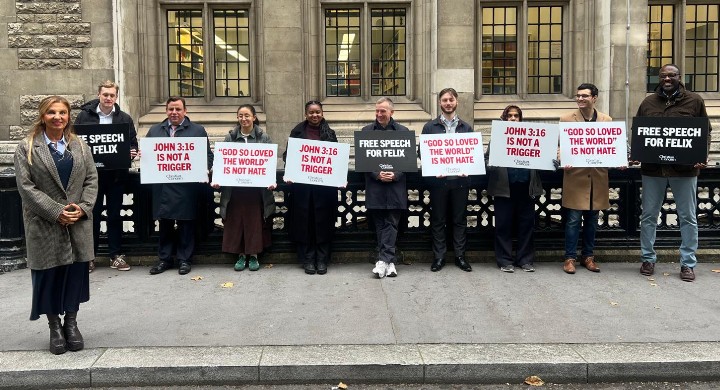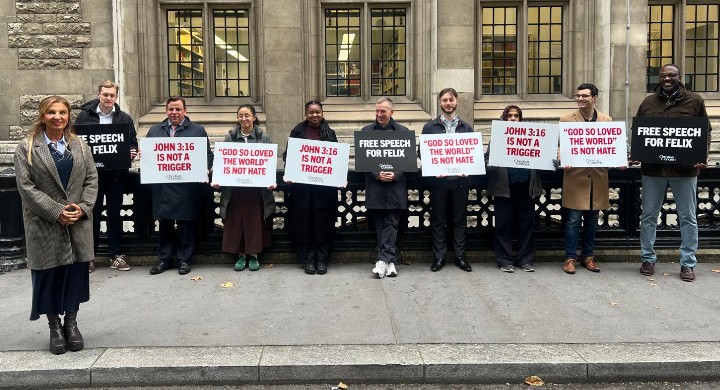Today (Oct 29), Christian social worker Felix Ngole will appear before the Employment Appeal Tribunal (EAT) in London this week to challenge a ruling that he was lawfully denied employment due to his Christian beliefs on marriage and sexuality.
The hearing is taking place at the Employment Appeal Tribunal in London on 29 and 30 October 2025. Supporters gathered outside the court this morning in support of Felix and Christian freedoms.
Felix, who, supported by the Christian Legal Centre, previously won a landmark free speech case against the University of Sheffield in 2019, is now appealing a decision by the Leeds Employment Tribunal which upheld the withdrawal of a job offer by mental health charity Touchstone Leeds.
The charity rescinded its offer after discovering Felix’s past public statements affirming and debating Biblical teaching on marriage, which it claimed were incompatible with its values and posed a risk to LGBTQI+ service users.
Despite acknowledging that Felix’s views were rooted in his Christian faith, the Tribunal ruled that Touchstone’s decision was justified due to concerns about reputational damage and the mental health impact on service users who might discover his beliefs online.
Employment Judge Jonathan Brain ruled that Christian social worker Felix Ngole was discriminated against when his job offer was withdrawn due to his expression of religious beliefs.
However, the judge in a confused ruling surprisingly then concluded that Touchstone Support Leeds was justified in not reinstating the job offer, citing ‘safeguarding concerns’ for LGBTQI+ service users.
The ruling stated that Felix’s orthodox Christian views on sexuality were a “material reason” for the withdrawal, and that Touchstone had “well-founded concerns” that his beliefs could negatively impact the mental health of service users.
In a striking moment during the hearing, Touchstone’s Head of Operations, Dave Pickard, an LGBTQI+ activist, claimed that even quoting John 3:16 could be “triggering” for service users. He further suggested that expressing disagreement with same-sex marriage or stating there are only two genders “could lead to death.”
In a disturbing development, Judge Brain concluded that Touchstone’s actions were proportionate, and that the balance of rights favoured the organisation’s duty to protect its service users over Mr Ngole’s right to employment in this context.
During the employment tribunal hearing, a lay panel member, Mr Mohammad Taj, was recused due to a “real possibility of bias.” Mr Taj, a former President of the TUC, had a documented history of strong advocacy for LGBTQI+ rights.
Felix’s legal team will now argue at the Employment Appeal Tribunal that the ruling sets a dangerous precedent, effectively barring Christians who hold traditional views on marriage from working in professions that serve LGBTQI+ individuals.
The appeal will raise critical questions about the limits of freedom of speech, Christian expression, and equality law in the workplace.
The appeal challenges several aspects of the original ruling, including:
Leading up to the Employment Tribunal hearing, Touchstone lawyers sought to justify the actions of the NHS provider against Mr Ngole by submitting quasi evidence that individuals from LGBT backgrounds tend to suffer disproportionately from mental health problems in comparison to non-sexual minorities.
Mr Ngole and his lawyers asked for the evidence to be removed arguing that the evidence painted a false picture of the issue.
Refusing to, Mr Ngole’s lawyers urgently sourced and submitted expert evidence on ‘minority stress theory’ by Reverend Dr Paul Sullins, which saw the theory analysed and ruled upon in a UK court for the first time.
Ahead of the appeal, Mr Ngole said:
“I was pleased that the tribunal found that I was discriminated against, but there were so many disturbing comments and conclusions in it as well which meant I had to appeal. The ruling ultimately sets a dangerous precedent as it gives employers the freedom to block Christians, and anyone who doesn’t promote LGBTQI+ ideology, from employment.
“If I was discriminated against when they withdrew the job offer then I don’t see how I was not also discriminated against when they refused to reinstate me after the ‘second interview.’ I was told I was the best candidate for the job, I got the highest marks on the diversity questionnaire, then they suddenly found I was unemployable because they discovered that I am a Christian who believes in marriage.
“No one has ever told me that I have not treated them well in my professional experience. I have never been accused of forcing my beliefs on anyone. I have supported vulnerable individuals from all backgrounds, including LGBT.
“It is untenable for employers to be allowed to discriminate against Christians in this way and to force individuals to promote an ideology that goes against their conscience in the workplace. There was no mutual respect, and no tolerance and inclusion of me and my beliefs whatsoever.
“If we get to the point where if you don’t celebrate and support LGBT ideology you can’t have a job, then every Christian out there doesn’t have a future. You can study as much as you like, but you will not have a chance. The UK is no longer the country I heard about all those years ago when fleeing Cameroon. The UK then was a bastion of free speech and expression.”
Andrea Williams, chief executive of the Christian Legal Centre, said:
“The previous ruling in this case was muddled, inconsistent, and needlessly convoluted. The Tribunal was ultimately compelled to find that Felix Ngole had been directly discriminated against for expressing his Christian beliefs, the evidence left no room for any other conclusion. That should have been the end of the matter. Felix ought to have been fully exonerated, compensated, and reinstated without delay.
“Instead, Judge Brain goes on to state that Felix’s Christian beliefs mean that Touchstone acted in a right and proportionate manner not to reinstate him. Judge Brain held that it was legitimate for Touchstone to discriminate against Felix for merely holding and expressing on social media a traditional Christian belief on marriage and sexuality because of the potential harm to people identifying as LGBTQI.
“This ruling opens up the reality of employers discriminating against and denying employment to anyone who does not celebrate and promote complete LGBT affirmation. We are creating a society where social workers, doctors, nurses and psychologists, for example, have to be silent or face accusations that merely holding their protected beliefs could lead to patients coming to harm.
“You could not ask for a better and more compassionate social worker than Felix Ngole. Felix loves Jesus and believes what the Bible says about who we are as humans. The Court of Appeal found that Felix had not and wasn’t likely to discriminate against anybody. However, this ruling concludes that just the knowledge that he holds Christian beliefs on human sexuality means he is unsuitable for employment in the NHS.
“This ruling cannot stand and it is deeply discriminatory. We will fight for Felix until he receives justice.”
Join our email list to receive the latest updates for prayer and action.
Find out more about the legal support we’re giving Christians.
Help us put the hope of Jesus at the heart of society.
Join us on:
Join us on:
© 2025 CCFON Ltd. All Rights Reserved.
‘Christian Concern’ is a trading name of CCFON Ltd. CCFON Ltd is registered in England and Wales (Company Number 6628490).
Registered office: 70 Wimpole Street, London W1G 8AX.
© 2025 CCFON Ltd. All Rights Reserved.
‘Christian Concern’ is a trading name of CCFON Ltd. CCFON Ltd is registered in England and Wales (Company Number 6628490).
Registered office: 70 Wimpole Street, London W1G 8AX.
Our website uses cookies, usage analysis and other similar tools
We use these tools because they help us to run our website, provide you with content (including video and audio clips), understand how people use our website, make improvements to our services, and promote our work more effectively. This means that we and selected third-party services may store cookies and other similar information on your device, and may analyse your use of our website. Some of these tools are necessary for our website to function as intended but others are optional, and you can choose whether or not to allow them.
Find out more and review your options
Our website uses cookies, usage analysis and other technologies. We use these tools because they help us to run our website, provide you with content (including video and audio clips), understand how people use our website, make improvements to our services, and promote our work more effectively. This means that we and selected third-party services may store cookies and other similar information on your device, and may analyse how you use our website. Some of these tools are necessary for our website to function as intended but others are optional, and you can choose whether or not to allow them. You can find out more here.
Certain cookies and other technologies are used on our website to provide core functionality. You can read more about this here. You may be able to use your browser settings to block these tools but if you do, our website may not function as intended.
To enrich your experience of this website, we embed carefully selected content from other platforms. For example, we embed video clips from our YouTube channel, and audio clips from our SoundCloud channel. These third-party platforms may store and use cookies (or similar technology) on your device, and may analyse your use of this site or the embedded content. We do not directly control what technologies they use. You can find out more here. If embedded content is disabled it may affect your experience of this website.
This website uses tools from selected third-party providers (Google and Facebook) to help us understand how people arrive at and use our website, and to measure and improve the effectiveness of some of our promotional activity. These tools may store and use cookies (and similar information) on your device, and analyse your use of this website, and other sites and platforms. These tools help us to improve our services, reach people who may be interested in our work and make better use of our resources but information may be shared with these third-party providers and may be used for their own purposes. You can find out more here.
You can find out more about this website’s use of cookies, usage analysis and similar technologies here.
